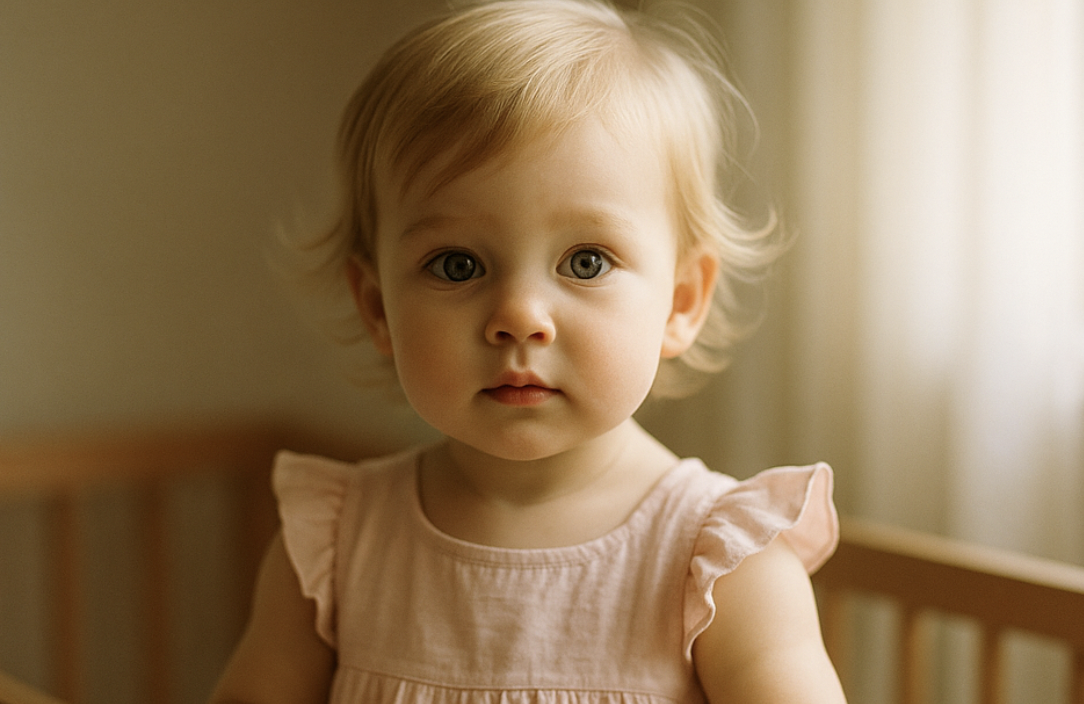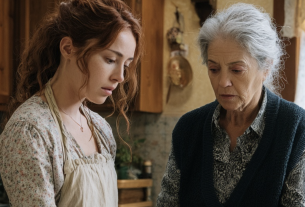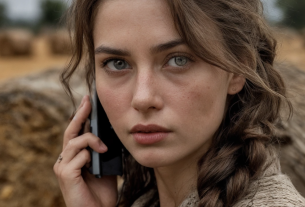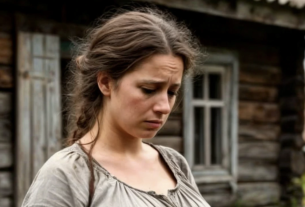At first, Genka thought his mother had simply gained weight. Though in a strange way. Her waist had suddenly rounded out, while the rest of her looked the same as before. It felt awkward to ask—what if his mom took offense? His father kept quiet, gazing at her with tenderness, and Genka pretended he hadn’t noticed anything either.
But soon her belly was clearly growing. Once, walking past his parents’ room, Genka happened to see his father stroking his mother’s belly and whispering something to her sweetly. She was smiling, pleased. The scene made him uncomfortable, and he hurried away.
“Mom is expecting a baby,” Genka suddenly guessed. The thought didn’t so much surprise him as shock him. His mother, of course, was beautiful and looked better than many of his classmates’ moms, but a pregnancy at her age filled him with a kind of rejection. It was embarrassing even to think about it. Genka had long known where babies came from and suspected a lot more, but he couldn’t picture his parents doing that. After all, it was his mom and dad.
“Dad, is Mom expecting a baby?” he asked his father one day.
For some reason it was easier to talk to him about it.
“Yes. Mom’s dreaming of a daughter. It’s probably silly to ask which you’d prefer—a brother or a little sister.”
“Do people even give birth at that age?”
“At what age? Mom is only thirty-six, and I’m forty-one. Are you against it?”
“Did anyone ask me?” Genka shot back roughly.
His father looked at him carefully.
“I hope you’re grown-up enough to understand us. Mom’s wanted a daughter for a long time. When you were born, we were renting. Mom stayed home with you, I was the only one working, and the money barely covered the bare necessities. So we decided not to rush into a second child. Then Grandma died, and your grandparents gave us her apartment. Do you remember Grandma?”
Genka shrugged.
“We did some remodeling and moved in. When you got older and Mom went back to work, money got easier, I bought our first car. We kept putting off having a daughter, telling ourselves there was time. And then it just wouldn’t happen. And now, when we’d already stopped hoping and waiting…”
“I hope it’s a girl, like Mom wants. Of course our mom is young, but she’s not a girl anymore. So at least try not to upset her, so she won’t worry. Think before you snap or say something you’ll regret. If anything, tell me. Deal?”
“Yeah, I got it, Dad.”
Later they found out it really would be a girl. Pink baby things started appearing around the house. To Genka they seemed tiny, doll-like. A crib showed up. Mom often drifted out of conversations, sitting distant as if listening to herself. Then Dad would ask anxiously if everything was all right. His father’s anxiety rubbed off on Genka.
Personally, he couldn’t care less about a baby—especially a sister. What did he need with snot and diapers? The only person he needed was Yulya Fetisova. If his parents wanted another child, that was their business. What was it to him? It was even good in a way. They’d be busy with her and nag him less. At least there was some benefit to a future sister.
“Is it dangerous? I mean, giving birth at her age?” Genka asked.
“There’s risk at any age. Sure, it’s harder for Mom now than when she was expecting you—she was thirteen years younger then. But we don’t live in the woods or a village; we live in a big city with well-equipped hospitals and doctors… Everything will be fine,” his father added wearily.
“When? How long?”
“What, the birth? In two months.”
But Mom gave birth a month early. Genka woke to noise. He heard a groan and footsteps rushing around behind the wall. He got up and, blinking sleepily, went to his parents. Mom was sitting on the rumpled bed with her hands on her lower back, rocking back and forth like a pendulum and moaning. Dad was nervously running around the room, gathering things.
“Just don’t forget the folder with the documents,” Mom managed, closing her eyes.
“Mom,” Genka called, instantly awake and catching the general alarm.
“Sorry we woke you. The thing is… Where’s that ambulance?” Dad asked the air.
The air answered with the doorbell, and he dashed to open it. Genka couldn’t decide whether to get dressed or stay with Mom, just in case. But then a man and a woman in EMS uniforms came in, went straight to Mom, and started asking odd questions:
“How long have the contractions been? How often? Has your water broken?” When another contraction hit, Dad answered for her.
No one was paying attention to Genka, so he slipped out. When he came back already dressed, Dad and Mom were leaving the apartment. She was still in her robe and slippers. At the door Dad glanced back.
“I’ll be right back—tidy up here.” He wanted to add something else, but Mom cried out and hung on his arm.
Genka stood listening to the unfamiliar silence for a while, staring at the door. Then he went back to his room and checked the time. He still had two hours to sleep. He carefully folded out the sofa, picked up the scattered things, and went to the kitchen. Dad returned when Genka was getting ready for school.
“So? Did she have the baby?” he asked, trying to read his father’s face.
“Not yet. They didn’t let me in. Pour me some tea.”
Genka set a cup of tea before his father and made sandwiches.
“I’m going?” he asked.
“Go. I’ll call when there’s news,” Dad promised.
Genka was late to school.
“Mr. Kroshkin has deigned to grace us with his presence. Why are you late?” the math teacher asked.
“We called an ambulance for my mom; they took her to the hospital.”
“Sorry. Sit down,” the teacher softened.
“His mom’s having a baby!” Fyodorov yelled, and snickers rippled through the class. Genka snapped his head toward him.
“Quiet! Kroshkin, sit down already. And what’s so funny about that?”
Dad called during the last period.
“May I step out?” Genka raised his hand.
“Nature’s calling? There are twenty minutes left—hold it. And put your phone away,” the Russian teacher said.
“His mom’s in the maternity ward,” Fyodorov shouted again, but this time no one giggled.
“All right, go,” the teacher allowed.
“What is it, Dad?” Genka asked when he stepped into the hallway.
“A girl! Three kilos one hundred grams! Whew,” his father shouted into the receiver, relieved.
“Well?” the Russian teacher asked when he came back into the classroom.
“It’s all good—a girl,” Genka answered automatically.
“Now Kroshkin will be the babysitter,” Fyodorov snorted again. The class exploded with laughter, drowning out the bell.
Firsova caught up with him on the street and walked beside him.
“How old is your mom?” she asked.
“Thirty-six.”
“Don’t get me wrong, I’m happy for you—for you all. A little sister is great. I’m an only child. My parents didn’t want more kids…” They walked and talked, and for the first time Genka felt glad he had a sister.
Three days later they discharged Mom from the hospital.
“What a beauty!” Dad said, peering at his daughter.
Genka saw nothing beautiful. A tiny, wrinkled body, a red face, a little bow mouth and a button nose. His standard of beauty was Firsova. Then the baby opened her toothless mouth and squeaked. And immediately turned as red as a tomato. Mom quickly took her in her arms and began rocking her, murmuring “Shhh…” over and over. It was strange to realize that his mom had become someone else’s mom too.
“What will we name her?” Dad asked.
“Vasilisa,” Mom answered.
“What a cat’s name. They’ll call her Vasya at school,” Genka snorted.
“Then Masha, after Grandma,” Dad suggested.
Life now revolved around little Mashenka, as Mom fondly called her—around her needs. No one paid attention to Genka, except to ask him to run to the store, take out the trash, pull the laundry from the washer and hang it in the bathroom. Genka gladly helped.
But when Mom once asked him to take the stroller out for a walk while she washed the floor, Genka balked. Better Mom go for a walk herself—it would be good for her to get fresh air—and he’d wash the floor.
“I’m not going. What if the guys see me? They’ll laugh,” he muttered.
“I’ve already dressed her; she’ll overheat. And you dress warmer yourself—it’s cold outside. If you catch a cold, you could infect Mashenka, and she’s too little and fragile to get sick,” Mom said.
Genka was circling the yard with the stroller when he saw Firsova. Before, she would’ve walked past pretending not to notice him; now she came straight toward him.
“Mashenka! She’s so sweet,” Firsova cooed and walked along with him. The neighbors smiled when they met, and Genka didn’t know where to hide his eyes from embarrassment.
In the evening Mom rocked Mashka and sang her a lullaby. Genka listened and drifted off unnoticed.
But Mashenka fell ill anyway. At night her fever spiked. Medicine brought it down a little. Mom and Dad took turns carrying her in their arms all night. In the morning the temperature began to creep up again; nothing would bring it down. Mashenka breathed fast and with effort. Dad called an ambulance.
No one blamed Genka for anything, but he felt guilty. He hardly left his room.
“She really gave us the business,” Dad said, stepping into his room after the ambulance took Mom and Mashenka away.
“Will she get better?” Genka asked cautiously.
“I hope so. Of course she will. There are good medicines now, antibiotics…”
Genka hadn’t thought he would worry so much. At school he answered at random and got a C, though he knew the material cold. When he came home, Dad was sitting in the kitchen staring at a single spot. Anxiety stirred in Genka’s heart.
“Dad, why are you home? Are you sick?” he asked.
His father was silent for a long time.
“Our Mashenka’s gone,” he said with a sigh.
Genka thought his father was raving, and then the meaning sank in.
“It happened so fast… There was nothing they could do…” Dad covered his face with his hands and either growled or sobbed.
“Dad…” Genka came over, not knowing what to say.
His father hugged him, and for the first time Genka saw him cry. He himself burst into tears like a little kid.
He wanted to disappear. If only he had died and not Mashka. Later Mom came back from the hospital. Genka barely recognized her. She’d become a shadow of his former mother. Silence and darkness settled over the apartment, though it was bright daylight outside. Genka’s heart tore to pieces—from pity for Mom, for Mashenka, and from the awareness of his own guilt.
After the funeral Mom sat for hours by the empty crib. At night she would jump up and run to it. She dreamed she heard Mashenka crying. Dad could barely lead her back to bed. A week passed like that, then another, a month. Spring was coming. It seemed joy and laughter had left their home forever.
“Listen, before the roads turn to slush, we need to take the crib and things out to the dacha, or your mom will go out of her mind,” Dad said on Saturday. “I’ll take apart the crib, and you gather all the things and toys. The bags are over there.”
“What about Mom?” Genka asked.
“She went to Aunt Valya’s. She doesn’t need to see this.”
There was still snow along the highway outside the city. The sun peeked through dense gray clouds. Genka suddenly thought that Mashenka would never see spring, never squint at the sun’s rays, never hear thunder… Tears welled up, and he shook with silent sobs. Suddenly Dad pulled over to the shoulder.
“Sit tight, I’ll go see if anyone needs help.”
Only then did Genka notice the cars ahead and a cluster of police. He got out and walked over too. A mangled red car caught his eye. The truck’s door was open; a man sat on the step repeating, “I only closed my eyes for a moment…” One policeman was holding a baby carrier. Something pink was inside. Genka stepped closer. A girl about Mashenka’s age was sleeping there.
“Can you imagine—parents dead, and she’s fine, not a scratch,” said a young policeman.
In the distance a siren wailed. The girl woke up and started screaming, just like Mashenka. The policeman flustered and stared at her helplessly.
“Give her to me. I had a little sister…” Genka faltered.
The policeman looked doubtful but handed him the carrier. Genka lifted the girl out and pressed her to his chest. And miracle of miracles—she quieted!
“How did you do that, kid?” the policeman marveled.
“Girl from the car? Let’s go,” another policeman came over and led Genka to the ambulance.
“Brother?” the doctor asked Genka. “Give me the girl.” But Genka stepped back.
“Are you going to take her to the hospital?” he asked.
“Yes, they’ll examine her there, and then she’ll go to a baby home or orphanage.”
“Dad…” Genka looked reproachfully at his father, who had come up too. And his father understood everything.
“Could we take her? She seems fine. You see, my wife and I recently lost a child about the same age. My wife is suffering terribly. This girl would be her salvation,” his father began.
“By all means. Go to the guardianship office and file an application. If they don’t find relatives or the relatives refuse to take the child, then you can take her in. It all has to be formalized. Come on, kid, don’t waste time.”
Reluctantly, Genka handed the girl to the doctor.
“What’s her name?” he asked.
“Her documents say Vasilisa.”
He and his father exchanged a quick look.
“All right, let’s go,” Dad headed for the car first.
“To the dacha?” Genka asked, settling into the front seat.
“Home. We’ve no business at the dacha. We’ll still need those things.”
And Genka calmed down. He was surprised himself at how worried he was about someone else’s child.
“Dad, what if Mom won’t agree to take Vasilisa?”
Mom was sitting on the couch staring at the empty corner where the crib had stood.
“You’re back? The road was impassable?” she asked indifferently.
“Mom, you see, we met Vasilisa,” Genka said quickly, barely holding back his excitement.
“Whom?”
“Vasilisa.” And he and Dad began telling her about the accident.
Mom was silent for a long time. Then she said she would go to the hospital tomorrow and find out everything.
“Hooray!” Genka and Dad shouted…
“— It’s all so sad…” Katya drooped. “What is a childhood without parents?
… No matter how hard she tried to convince herself that an orphanage was a forced necessity, she couldn’t believe in such a way of the world. It was strange that most people didn’t feel this horror, soaked through with the smells of institutional life. They could come here to work, do their tasks, and not notice the children’s screaming gaze: ‘take me home.’
… Every adult, unlike a child, has a choice. And that choice is never easy—it’s always complicated, agonizing, and full of doubt. But it can give hope.”



